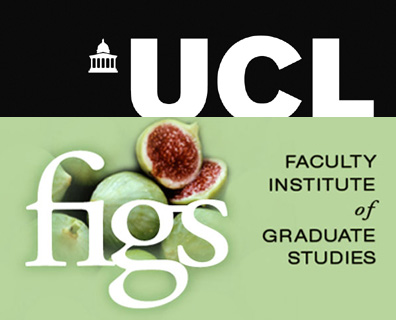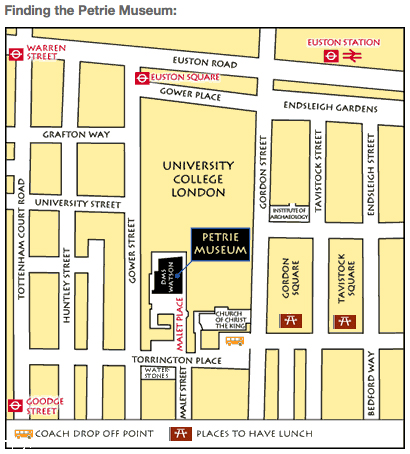A Public Roundtable at the Petrie Museum, UCL, London
26 March 2014, Petrie Museum, University College London 6:00pm
The area of Bloomsbury is known for its connection to literature, culture, art and education. As the home of the Bloomsbury Group, it is an area in which many well-known writers have resided; it is also where several of London’s best loved museums and UCL’s main campus are located. However, aspects of its less well-known history have recently been explored by a number of UCL academics, seeking to re-evaluate Bloomsbury: including work on the presence of slave-owners, African and Asian students, and members of the LGBT community, as well as on the development of Egyptian Archaeology and eugenics.

The connections of these elements to each other, and of each to the area of Bloomsbury, was the focus of a roundtable discussion entitled ‘Rethinking Bloomsbury’ held on 26 March at the Petrie Museum. This interdisciplinary event was organised by the Legacies of British Slave-ownership Project (LBS), History Department, UCL in conjunction with the Petrie Museum, UCL and sponsored by the Joint Faculty Institute of Graduate Studies (J-FIGS). The aim was to facilitate a conversation between UCL-based projects which investigate these diverse yet connected Bloomsbury histories in order to gain a wider understanding of the history of UCL’s Bloomsbury campus and the surrounding district.
Representatives from each project gave brief presentations about their work, after which all participants engaged in a roundtable discussion, followed by questions from the audience.
Participants:
Caroline Bressey, Director of the Equiano Centre and Lecturer in the Department of Geography, UCL. She was Principal Investigator on the AHRC funded project (2012-2013) 'Drawing over the Colour Line: geographies of art and cosmopolitan politics in London 1919-1939’. Caroline also co-curated Black Bloomsbury with Dr Gemma Romain; the exhibition was held at the UCL Art Museum between 23 September and 13 December 2013.
Debbie Challis, Audience Development Officer, Petrie Museum of Egyptian Archaeology. She is interested in, among other things, the impact of racial science on ideas about the past. Her book, The Archaeology of Race. The Eugenic Ideas of Francis Galton and Flinders Petrie (London: Bloomsbury Academic), was published in 2013.
Subhadra Das, Curator UCL Teaching and Research Collections. She is the primary contact for the UCL Pathology Collections and the Galton Collection.
Nicholas Draper, Co-Director, Legacies of British Slave Ownership: Structure and Significance of British Caribbean Slave-Ownership 1763-1833 (LBS). His foundational analysis of the Slave Compensation records was published by Cambridge University Press in 2009 as The Price of Emancipation: Slave-Ownership, Compensation and British Society at the End of Slavery. As part of his work on the compensation records, Nick has investigated the links between slave-ownership and people living in Bloomsbury.
John J. Johnston, Post Graduate Researcher, Institute of Archaeology, UCL. He has contributed substantially to The Petrie Museum of Egyptian Archaeology's programme of events for LGBT History Month since 2008 and has delivered walking tours of Egyptological and academic Bloomsbury. In so doing, he has encountered a number of fascinating historical figures from the academic and creative worlds who have contributed to Bloomsbury's diverse sexual ambience.
Chair: Kristy Warren, Research Associate, LBS, Department of History, UCL.
You can find the Petrie Museum here:
